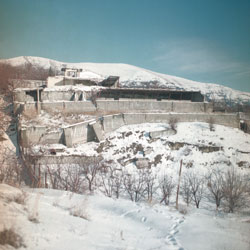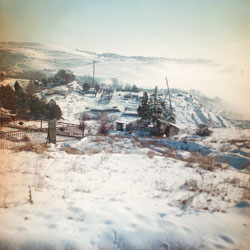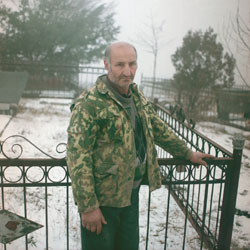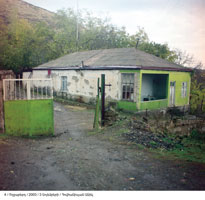|
 |
 |
| Karen Andreassian, La datcha de la famille Mekertoumian, Voghchaberd, novembre 2003 |
Karen Andreassian, La datcha de la famille Mekertoumian, Voghchaberd, décembre 2003 |
The show at the Centre for Contemporary Images features a project that Andreassian began in March 2003. The subject of his observation and research is the village of Voghchaberd, located 10 km from Erevan. During the Brezhnev years, the place was a prosperous, prestigious village where apparatchiks eagerly built their datchas. The recent history of the village’s landscape coincides with two phenomena, the collapse of the Soviet Union and a natural disaster, a catastrophic landslide. In the history of the village’s development in fact, several attempts have been made to move Voghchaberd to another area.
Andreassian founded his project then on the twofold reality of the shifting character of the place and the inhabitants’ desire to remain. The artist has moved the village to an electronic space, <www.voghchaberd.am>. The Website is a process then that is meant to be pursued by this local collectivity. It functions as a pre-face, rather than an inter-face, while remaining an integral part of the show. The video images and photos of this exhibition/expedition are like a thread running throughout the representation of time, for it is indeed the reality of time that links geophysical and socio-political phenomena.
 |
 |
| Karen Andreassian, Le cimetière, Voghchaberd, décembre 2003 |
Karen Andreassian, Hrach Nahapetyan, Voghchaberd, décembre 2003 |
The village of Voghchaberd concentrates within itself both the constancy of geological instability (landslides) and the consequences of the 20th century’s political upheavals (World War I, the genocide of 1915, Sovietization, Stalinism, World War II and finally the fall of the USSR, the 1988 earthquake and the war of Karabagh). The current landslides can be viewed then as a concrete symbol not only of the endless Armenian crisis in the 20th century, but above all of the village’s capacity to adapt. The cause of the area’s landslides, the region’s underground humidity, at the same time constitutes the fertility of the village’s land. This reality creates the conditions for relative socio-economic stability within instability itself, which explains why many have refused the government’s offers of relocation. This «unstable stability» has given rise to new kinds of dwellings that call into question the traditional way of throwing up four stone walls. The «Voghchaberdtsi» are thus inventing a way of living in a changing environment that represents something more than mere survival. Thus, there is life, even possible prosperity, in exposing oneself to danger, in the contingent. It is the work of simple humanity, which makes do with what it has on hand. A catastrophe is always in the offing and people understand that it is useless to project a stable state after the «transition.»
To present the Voghchaberd project via a documentary approach offers a possible opening up to history and its fractures, images that speak to us from the other side of History and conjure up the memory of the Other. To emphasize this other history means «to configure a world, a quantity of possible worlds in the world,» to transform the world rather than interpret it, which implies grasping it anew beyond representation.

Karen Andreassian, Voghchaberd, 2003
|




